Top 20 Presentation Skills for Resume – How to Highlight with Examples
- Resume Format
- October 29, 2024
- Resume Skills
Presentation Skills for Resume : In today’s competitive job market, showcasing strong presentation skills on your resume can set you apart from other candidates. Employers increasingly seek individuals who can effectively communicate ideas, engage audiences, and deliver compelling messages. Highlighting your presentation abilities not only demonstrates your confidence but also signals your potential to contribute positively to team dynamics and organizational goals.
This article delves into the top 20 presentation skills that can elevate your resume and enhance your appeal to prospective employers. From mastering visual aids to honing your storytelling techniques, each skill plays a crucial role in creating impactful presentations. We’ll provide practical examples to illustrate how you can effectively incorporate these skills into your resume, ensuring you stand out in a crowded field.
By the end of this guide, you’ll be equipped with the knowledge to showcase your presentation prowess, making your resume not just a list of qualifications, but a compelling narrative of your professional capabilities.

What are Presentation Skills
Presentation skills encompass the ability to effectively communicate ideas, engage an audience, and convey information clearly. These skills include verbal and non-verbal communication, organization, storytelling, and the use of visual aids. Mastering presentation skills enhances confidence and helps create a lasting impact, making the message more memorable and persuasive.
Why Presentation Skills Important
Effective presentation skills are crucial in today’s fast-paced, competitive environment. They empower individuals to communicate ideas clearly and persuasively, making a significant impact on personal and professional success. Here are several reasons why honing these skills is essential:
- Enhanced Communication : Strong presentation skills enable you to articulate your thoughts clearly, ensuring your audience understands your message.
- Increased Confidence : Mastering the art of presentation boosts self-confidence, allowing you to engage with your audience more effectively.
- Persuasive Influence : Well-developed presentation skills can persuade and motivate others, whether in a business meeting, classroom, or public speaking event.
- Career Advancement : Professionals with strong presentation abilities are often viewed as leaders, opening doors to promotions and new opportunities.
- Improved Engagement : Dynamic presentations capture attention, keeping your audience engaged and interested in your content.
- Effective Storytelling : Presentation skills allow you to weave narratives that resonate emotionally, making your message more memorable.
- Better Feedback : Skilled presenters can read their audience’s reactions and adjust their delivery accordingly, fostering a more interactive experience.
- Networking Opportunities : Presenting effectively can lead to valuable connections, as you showcase your expertise and build relationships with peers and industry leaders.
Investing time in developing your presentation skills can lead to significant personal and professional growth, making it an invaluable asset in any field.
List of 20 Presentation Skills for Resume
- Public Speaking
- Audience Engagement
- Visual Aids Proficiency
- Storytelling
- Persuasive Communication
- Body Language Awareness
- Time Management
- Clarity of Speech
- Active Listening
- Adaptability
- Question Handling
- Feedback Reception
- Technical Proficiency
- Content Organization
- Emotional Intelligence
- Cross-Cultural Communication
- Networking Skills
- Conflict Resolution
- Presentation Software Expertise
Top Required Presentation Skills for Resume
- Public Speaking Ability to confidently address an audience, conveying ideas clearly and engagingly. Proficient in managing stage presence and utilizing vocal variety to maintain interest. This skill enhances communication effectiveness and fosters connection with listeners, making presentations more impactful.
- Visual Aids Utilization Expertise in designing and integrating visual aids like slides, charts, and videos to complement verbal messages. This skill helps clarify complex information, reinforces key points, and keeps the audience engaged, ensuring a memorable presentation experience.
- Audience Engagement Skilled in techniques to actively involve the audience, such as asking questions, encouraging participation, and using relatable anecdotes. This fosters a two-way communication flow, making presentations more interactive and enhancing audience retention of information.
- Storytelling Ability to weave narratives into presentations to illustrate points and evoke emotions. This skill captivates audiences, making content relatable and memorable, while effectively conveying messages through personal or relevant stories that resonate with listeners.
- Body Language Proficient in using non-verbal cues, such as gestures, facial expressions, and posture, to enhance communication. Effective body language reinforces spoken words, conveys confidence, and helps establish rapport with the audience, making the presentation more persuasive.
- Time Management Expertise in structuring presentations to fit within allocated time limits while covering all essential points. This skill ensures that presentations are concise and focused, respecting the audience’s time and maintaining their attention throughout.
- Clarity and Conciseness Ability to present information in a straightforward and succinct manner. This skill minimizes confusion, allowing the audience to grasp key concepts quickly and retain important details without feeling overwhelmed by excessive information.
- Adaptability Skilled in adjusting presentation style and content based on audience feedback and dynamics. This flexibility ensures that the message resonates with listeners, enhancing engagement and effectiveness, regardless of unexpected changes during the presentation.
- Technical Proficiency Familiarity with presentation software and tools, such as PowerPoint, Prezi, or Google Slides. This skill allows for the effective creation and delivery of visually appealing presentations, ensuring smooth transitions and professional aesthetics that enhance audience experience.
- Research Skills Ability to gather and analyze relevant data and information to support presentation content. This skill ensures that presentations are credible, well-informed, and tailored to the audience’s interests, enhancing overall impact and authority.
- Persuasion Techniques Expertise in employing rhetorical strategies to influence audience opinions and encourage action. This skill involves understanding audience motivations and crafting messages that resonate emotionally, leading to increased buy-in and commitment to ideas presented.
- Feedback Reception Skilled in accepting constructive criticism and using it to improve future presentations. This openness fosters personal growth and enhances presentation skills, demonstrating a commitment to continuous improvement and audience satisfaction.
- Confidence Building Ability to project self-assurance during presentations, instilling trust and credibility. This skill is developed through practice and preparation, allowing presenters to engage audiences more effectively and convey messages with authority.
- Q&A Management Proficient in handling audience questions and discussions during or after presentations. This skill involves active listening and thoughtful responses, ensuring clarity and maintaining engagement while addressing audience concerns or interests.
- Emotional Intelligence Ability to read and respond to audience emotions and reactions. This skill enhances connection, allowing presenters to adjust tone and content dynamically, fostering a supportive environment that encourages open communication.
- Networking Skills Expertise in building rapport with audience members before and after presentations. This skill facilitates relationship-building, creating opportunities for collaboration and feedback, and enhancing the overall impact of the presentation experience.
- Content Structuring Ability to organize presentation content logically and coherently. This skill ensures a clear flow of information, making it easier for the audience to follow along and understand the key messages being conveyed.
- Cultural Sensitivity Awareness of diverse cultural backgrounds and tailoring presentations accordingly. This skill fosters inclusivity and respect, ensuring that content resonates with a varied audience and avoids misunderstandings or offense.
- Voice Modulation Skillful use of vocal tone, pitch, and pace to enhance delivery. This technique keeps the audience engaged, emphasizes important points, and creates an emotional connection, making the presentation more dynamic and effective.
- Closing Techniques Expertise in crafting impactful conclusions that reinforce key messages and inspire action. This skill leaves a lasting impression on the audience, ensuring that the main points are remembered and prompting desired responses.
How to Highlight Presentation Skills on Resume
Highlighting your Presentation Skills on a resume is essential for showcasing your ability to communicate effectively and engage an audience. Strong presentation skills are highly valued in many industries, making it crucial to emphasize them in your job application. Here are some effective ways to showcase your Presentation Skills:
- Incorporate Keywords : Use “Presentation Skills” throughout your resume, especially in the summary, skills section, and experience descriptions. This helps your resume pass through Applicant Tracking Systems (ATS).
- Create a Dedicated Skills Section : Include a specific section for skills where you list “Presentation Skills” alongside other relevant abilities. This makes it easy for hiring managers to identify your strengths.
- Quantify Your Experience : Provide specific examples of your Presentation Skills by mentioning the number of presentations delivered, audience size, or the impact of your presentations. For instance, “Delivered over 20 presentations to audiences of 50+.”
- Highlight Relevant Experience : In your work experience section, detail roles that required strong Presentation Skills. Describe your responsibilities and achievements related to presenting information effectively.
- Include Certifications or Training : If you have taken courses or received certifications related to public speaking or presentation skills, list them. This demonstrates a commitment to improving your abilities.
- Showcase Projects : Mention any projects where you utilized your Presentation Skills. This could include leading team meetings, training sessions, or client presentations.
- Use Action Verbs : Start bullet points with strong action verbs like “Presented,” “Facilitated,” or “Engaged” to convey your active role in utilizing your Presentation Skills.
By effectively highlighting your Presentation Skills, you can make a compelling case for your candidacy and stand out to potential employers.
Sample Presentation Skills for Resume
[your name].
[Your Address] [City, State, Zip] [Your Email] [Your Phone Number] [LinkedIn Profile URL]
Dynamic and results-oriented professional with exceptional presentation skills, seeking to leverage expertise in delivering engaging and impactful presentations to enhance communication and drive results in a challenging role.
- Strong verbal and written communication skills
- Proficient in Microsoft PowerPoint and Google Slides
- Ability to simplify complex information for diverse audiences
- Excellent storytelling and narrative development
- Skilled in using visual aids and multimedia effectively
- Adaptability to various audience sizes and settings
- Strong time management and organizational skills
Presentation Specialist XYZ Corporation, City, State [Month, Year] – Present
- Developed and delivered over 50 high-stakes presentations to clients and stakeholders, resulting in a 30% increase in project approvals.
- Collaborated with cross-functional teams to create compelling presentation materials that effectively communicated key messages.
- Trained team members on best practices for effective presentations, enhancing overall team performance and confidence.
Marketing Coordinator ABC Company, City, State [Month, Year] – [Month, Year]
- Created and presented marketing strategies to executive leadership, leading to a 20% increase in brand awareness.
- Designed visually appealing presentation decks that highlighted campaign performance and future initiatives.
- Conducted workshops on presentation skills for new hires, improving onboarding experience and team cohesion.
Bachelor of Arts in Communication University of State, City, State [Month, Year]
Certifications
- Certified Professional in Learning and Performance (CPLP)
- Advanced Presentation Skills Workshop, [Institution Name]
Professional Affiliations
- Member, National Speakers Association
- Member, Toastmasters International
Available upon request.
How to Develop Presentation Skills for Resume
Developing presentation skills is essential for standing out in today’s competitive job market. Strong presentation abilities can enhance your resume and make you a more attractive candidate. Here are effective strategies to develop presentation skills:
- Practice Regularly : Rehearse your presentations in front of a mirror or record yourself. This helps identify areas for improvement and boosts confidence.
- Seek Feedback : Present in front of friends or colleagues and ask for constructive criticism. This feedback is invaluable for developing presentation skills.
- Join Public Speaking Groups : Organizations like Toastmasters provide a supportive environment to practice and refine your presentation abilities.
- Study Great Presenters : Analyze speeches by skilled presenters. Note their techniques and styles to incorporate into your own presentations.
- Focus on Body Language : Non-verbal communication is key. Practice maintaining eye contact, using gestures, and adopting an open posture to develop presentation skills effectively.
- Use Visual Aids : Enhance your presentations with slides or props. This not only engages your audience but also helps you convey your message clearly.
- Tailor Content to Audience : Understand your audience’s needs and interests. This ensures your presentations resonate, making it easier to develop presentation skills that captivate listeners.
By consistently applying these strategies, you can significantly enhance your ability to develop presentation skills, making your resume shine.
Also Read : How to Add Skills Section in Resume
FAQs about Presentation Skills
What are presentation skills and why are they important for my resume.
Presentation skills refer to the ability to effectively communicate ideas and information to an audience. They are crucial for your resume as they demonstrate your capability to engage, inform, and persuade others, making you a more attractive candidate for roles that require public speaking or teamwork.
How can I showcase my Presentation Skills on my resume?
To showcase your presentation skills, include specific examples of successful presentations you’ve delivered, such as workshops, meetings, or conferences. Highlight any relevant training or certifications, and quantify your achievements, like audience size or feedback scores, to provide concrete evidence of your abilities.
Should I include Presentation Skills if I lack formal experience?
Absolutely! If you lack formal experience, you can still highlight your presentation skills by mentioning relevant coursework, volunteer experiences, or informal presentations. Focus on your ability to communicate clearly and confidently, and emphasize any transferable skills, such as teamwork or leadership, that demonstrate your potential.
How do employers evaluate Presentation Skills during the hiring process?
Employers often assess presentation skills through interviews, group discussions, or presentations as part of the hiring process. They look for clarity, engagement, confidence, and the ability to respond to questions. Demonstrating these skills can significantly enhance your chances of standing out among candidates.
Can I improve my Presentation Skills before applying for jobs?
Yes, you can improve your presentation skills through practice and training. Consider joining public speaking groups like Toastmasters, taking online courses, or seeking feedback from peers. Regularly practicing in front of an audience can help build your confidence and enhance your overall communication effectiveness.
Resume Tips
Choose the right format.
Select a resume format that best showcases your skills and experience. Common formats include chronological, functional, and combination resumes.
Tailor Your Resume
Customize your resume for each job application by highlighting relevant skills and experiences that match the job description.
Focus on Key Sections
Include essential sections such as contact information, professional summary or objective, work experience, education, skills, and relevant certifications.
Use Clear and Concise Language
Be concise and use action verbs to describe your accomplishments and responsibilities in each job role.
Quantify Achievements
Whenever possible, quantify your achievements with numbers or percentages to demonstrate your impact in previous roles.
Highlight Transferable Skills
Emphasize transferable skills that are relevant to the job you're applying for, such as communication, problem-solving, and leadership skills.
Prioritize Readability
Ensure your resume is easy to read by using a clean and professional font, adequate white space, and bullet points for listing information.
Proofread Carefully
Avoid spelling and grammar errors by proofreading your resume multiple times or asking a trusted friend or colleague to review it.
Keep it Updated
Regularly update your resume with new experiences, skills, and accomplishments to reflect your most current qualifications.
Seek Feedback
Consider seeking feedback from career advisors, mentors, or professionals in your industry to improve your resume further.
Related Posts

Top 20 Teacher Skills for Resume – How to Highlight, Examples
- November 6, 2024

List of Top 20 USA Skills for Resume – Samples & Examples
- November 7, 2024

Top 20 Machine Operator Skills for Resume – Samples & How to Highlight
- November 3, 2024

Top 20 Account Manager Skills for Resume – Samples & How to Highlight

Top 20 Medical Skills for Resume – Samples & How to Highlight
- October 28, 2024

Top 20 RBT Skills for Resume – How to Highlight with Examples
- November 9, 2024
Leave a Reply Cancel Reply
Your email address will not be published. Required fields are marked *
Name *
Email *
Add Comment *
Save my name, email, and website in this browser for the next time I comment.
Post Comment
Resume Templates
Resume samples
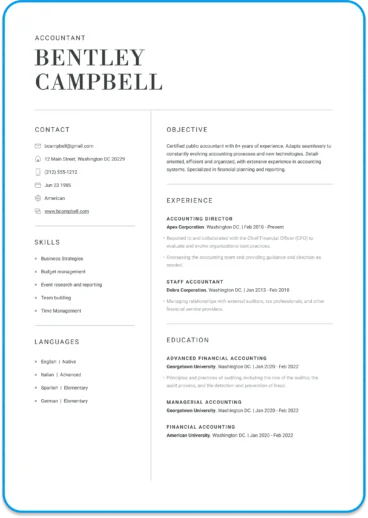
Create and edit your resume online
Generate compelling resumes with our AI resume builder and secure employment quickly.
Write a cover letter

Take a look at our cover letter guides and examples, to help you write a cover letter that complement your resume and enhace your applications.
Cover Letter Examples
Cover Letter Samples
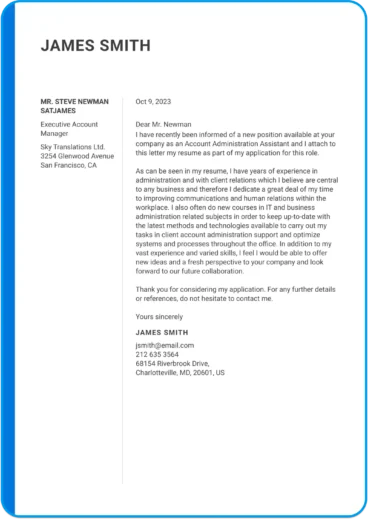
Create and edit your cover letter
Use our user-friendly tool to create the perfect cover letter.
Featured articles
- How to Write a Motivation Letter With Examples
- How To Write a Resume in 2025 That Gets Results
- Teamwork Skills on Your Resume: List and Examples
- What Are the Best Colors for Your Resume?
Latests articles
- How To Respond to a Rejection Email
- 5 Things to Do When You Are Overqualified for a Job
- Silent Strengths: Top Jobs for Introverts
- Flexible and Rewarding Jobs for Moms: 2025’s Top Picks

Dive Into Expert Guides to Enhance your Resume
How to Add a Conference or Seminar to Your Resume

If you want to stand out in today’s competitive job market, you need to clearly demonstrate your competitive edge on your resume. Adding more sections to your resume can feel confusing and overwhelming, however, by mentioning your honors and other professional development participation you can increase your chances of getting hired . In this article, we are going to show you how to add a conference or seminar to your resume.
Over the years, many employers have shared their desire to hire more proactive and adaptable professionals who believe in the importance of continuous learning.
If you enjoy networking and learning about emerging trends, you’ve likely been to or will go to a conference or seminar related to your field . Attending industry-related conferences allows you to build your professional brand while also making connections that can prove beneficial long-term.
Attending conferences and seminars also demonstrates your commitment to your field , self-improvement, and dedication to continuous learning. Employers understand that they need employees who value continuous growth because that’s what helps push them forward.
To ensure you fully understand how to add a conference or seminar to your resume, we’ll go over:
- Where to put seminars attended in your resume
- How to list conferences in your resume
- When adding seminars and conferences is most beneficial
We’ll even go over how trainings and seminars attended look in a resume example. After gathering this information, you can try out our free AI-supported resume builder to quickly create your application.
Craft your ideal resume with our intuitive editor
Increase the possibility of getting the job you want with our professional resume templates

Does My Resume Need Information on Conferences or Seminars?
There are so many personal branding, growth, learning, and networking opportunities available when attending conferences in your field., In addition to the opportunities listed, there are many more benefits to attending conferences . However, many applicants ignore this part of their background on their resume simply because they are not sure where to put it or how it ties in to their professional history.
Even though we know that recruiters will be more interested in learning more about your skills and hands-on work experience , adding the conferences can be helpful.
This is especially the case for:
- Career changers
- Recent graduates
Specifically, adding a seminar or conference to your resume can help you if you want to find a job in any of the following industries :
- Marketing and Advertising
- Higher education
- Engineering
- Arts and Culture
- Medicine and Healthcare
- Information Technology (IT)
- Design and Creativity
However, if you think it won’t be important to the position, be as brief as possible. Space is precious on your resume, and you only want to highlight your most essential qualifications .
Below, we’ll look at how a conference or seminar can be successfully added to your document.
Enrich your resume with AI assistance and expert guidance
Enter your profession in the search bar and choose from AI-recommended results .
Powered by ChatGPT, it provides instant, natural language suggestions tailored for applicant tracking systems.
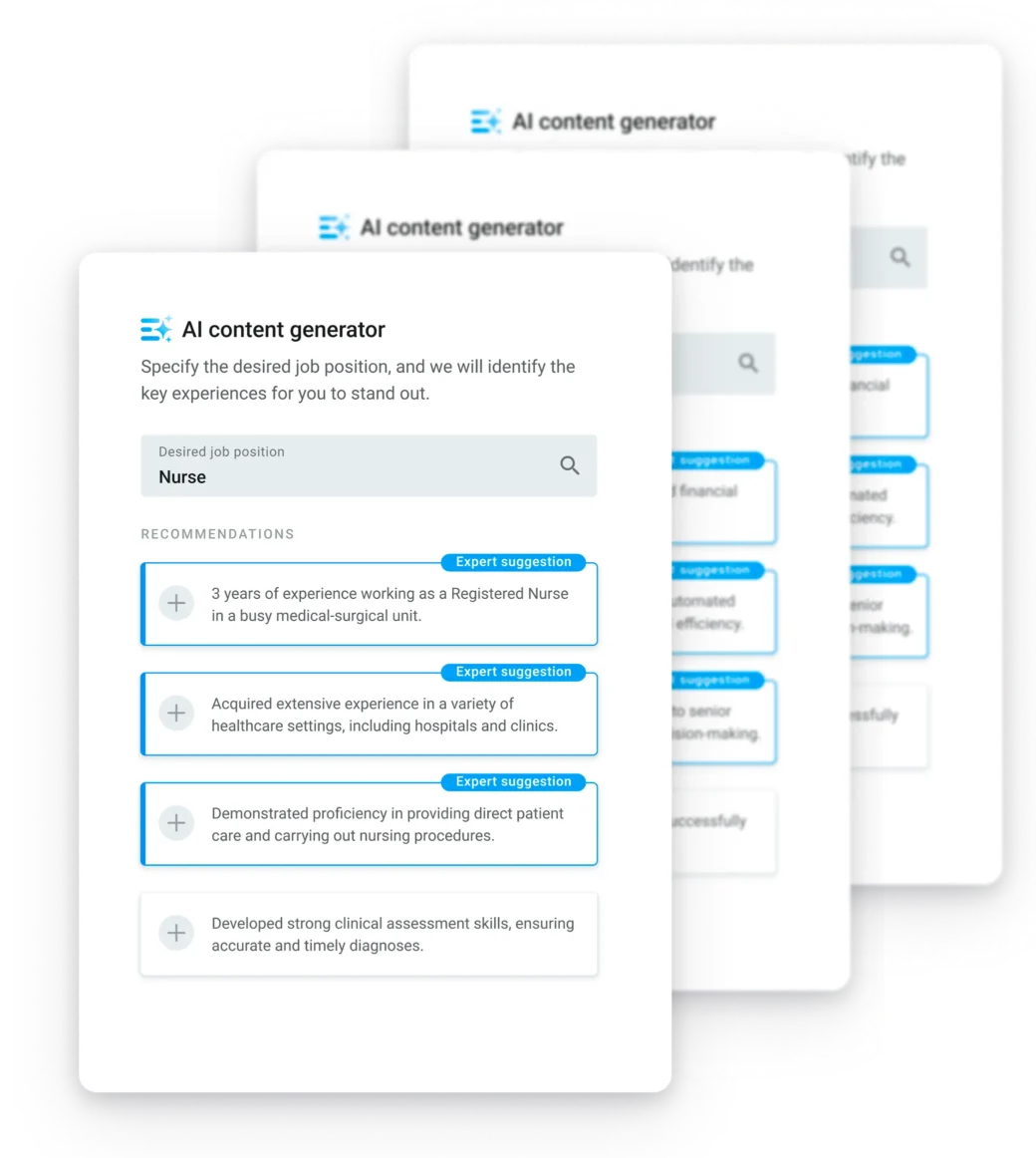
How to add Conference Details to Your Resume
When writing your resume, you must be strategic with how you phrase and display your accomplishments. Your goal is to capture the attention of the recruiter or hiring manager , quickly. This includes being clear, brief, and straight to the point. Your resume is not your extensive portfolio, this means you won’t need to cover every conference you’ve attended or presentation given.
This is especially true if this is an everyday part of your job. However, if you give a major keynote address at one of the world’s biggest conferences or you’re selected to facilitate a specialized training or workshop then this deserves to be highlighted.
When creating this section, you will need to indicate the following information:
- Names of the keynote speakers (note: if you attend a panel session, it’s ok to indicate that it was a panel and include the lead speaker’s name).
- Dates of the conference (note: you only need to include conferences or seminars attended within the last 5 years, you can showcase prior conferences on your LinkedIn profile or a separate portfolio).
- Name of the talk
- The organization hosting the event or the name of the event
For example, you would write conferences on your resume like this
Smith J and O’Neill T (2021, August) Example Presentation. Presented at Example Conference, New York
Example of adding a session with a panel:
Panel led by Smith J and O’Neill T (2021, August) Example Presentation. Presented at Example Conference, New York
If you are adding a keynote or training that you personally led, the format will be similar, except you will want to highlight that you were selected or requested for the opportunity:
Selected by (Name of Agency) to provide keynote/training on Name of Presentation. Presented at Example Conference, Location
A resume template will help you fill those details in with ease.
If you’re working in higher education or completing a Ph.D., it can also help to indicate conferences you’ve attended .
This is especially the case if you’re seeking your first postdoc role or wish to show off your industry knowledge.
On your resume, this will need a different approach than the one detailed above. You will need to show the employer:
- The name of the conference
- The organizing body
- The years attended
For example, this should be listed on your resume in the following ways:
Example 1: Example Organization Body (EOB) – 2017, 2018, 2019
Example 2: Example Professional Conference (EPC) – August 2019

Where to Put Seminars on a Resume
When it comes to including seminars and conferences on your resume, placement is key.
Typically, these details are best suited for two sections:
- Education section : If you’re a recent graduate or your seminars are highly relevant to your field of study under your degree(s). Adding them to your education section can enhance your qualifications.
- Dedicated section : For professionals in roles where continuous learning is essential, creating a separate section might be more impactful. This is especially true if you’ve participated in significant events, such as delivering a keynote address or leading a seminar. You can choose to call this section your “Career Enrichment” or “Continuing Education.”
Remember, the key is relevance and impact. Include seminars that add value to your profile and align with the job you’re applying for.
If you’re wondering if the seminars you’ve attended add value , simply ask yourself, “What skill or new knowledge did I gain?” Often conferences discuss emerging trends and hot topics , these are what you want to highlight on your resume to show employers you are “in the know.”
Whether you’re changing fields, want to continuously learn, or show that you are motivated, seminars can be a game changer .
Simply remember to:
- Highlight more information if conferences and seminars are important to your sector
- Include seminars and conferences in the right place on your resume
- Don’t forget the most important details
If you combine these tips with our easy-to-use tools , you’ll have little issue impressing hiring managers.
Struggling with Resume Writing?
Ease the process with our templates
Related Posts

Discover, Learn, Contribute, Connect
Guide: How to Include “Give Presentations” on Your Resume
When it comes to showcasing your skills and experiences on your resume, being able to effectively give presentations is a valuable asset. Whether you are applying for a job that requires public speaking or want to demonstrate your ability to communicate and convey information, it’s important to highlight your presentation skills in a way that captures the attention of potential employers or clients. In this guide, we will provide tips and examples on how to include “give presentations” on your resume, both formally and informally, to help you stand out from the crowd.
Table of Contents
1. Formal Ways to Include “Give Presentations” on Your Resume
In a formal setting, opting for a professional and concise description of your presentation skills will make a positive impression. Here’s an example:
Presentation Skills: Proficient in preparing and delivering professional presentations to large audiences, utilizing effective communication techniques and visual aids.
Using strong and action-oriented language, such as “proficient” and “utilizing effective communication techniques,” demonstrates your expertise and ability to engage large audiences effectively. Remember to tailor this description to your specific experiences and accomplishments.
2. Informal Ways to Include “Give Presentations” on Your Resume
If you’re looking for a more casual approach or want to showcase your presentation skills in a less formal setting, consider the following example:
Presentation Experience: Skilled at delivering engaging and informative presentations, using dynamic visuals and interactive elements to captivate audiences and facilitate learning.
This informal statement emphasizes your ability to engage and captivate audiences through the use of dynamic visuals and interactive elements. It shows your creativity and adaptability in crafting compelling presentations.
3. Tips for Including “Give Presentations” on Your Resume
Highlight Relevant Experience:
When discussing your presentation skills on your resume, be sure to highlight any specific experiences that demonstrate your ability to give presentations effectively. For example, if you have delivered presentations at industry conferences, within your organization, or during academic pursuits, mention these experiences to further validate your skills.
Showcase Transferable Skills:
Even if you haven’t had direct presentation experience in your previous roles, you can still highlight transferable skills that are applicable to giving presentations. Skills such as public speaking, effective communication, and using visual aids can be showcased to demonstrate your potential in delivering compelling presentations.
Quantify Your Achievements:
Whenever possible, provide specific metrics or achievements related to your presentations to make your resume more impactful. For example, you can mention the number of attendees at a conference where you presented, the positive feedback received, or the impact your presentations had on business outcomes, such as increased sales or improved client satisfaction.
Use Power Words:
To make your resume more engaging and attention-grabbing, use power words that convey action, accomplishment, and leadership. Some examples include “captivated,” “inspired,” “guided,” “facilitated,” and “influenced.”
4. Examples of Including “Give Presentations” on Your Resume
Presentation Skills: Highly skilled in delivering persuasive and impactful presentations to diverse audiences, resulting in increased engagement and improved client relationships.
Presentation Experience: Demonstrated ability to effectively communicate complex ideas through engaging presentations, leading to successful knowledge transfer and improved team collaboration.
Now that you have a better understanding of how to include “give presentations” on your resume, both formally and informally, you can confidently showcase your skills and experiences in this area. Remember to tailor your descriptions to your specific accomplishments, highlight transferable skills, quantify your achievements, and use powerful language to make your resume stand out. By effectively highlighting your presentation skills, you will increase your chances of landing the job or opportunity you desire.
Related Guides:
- How to Say Goodbye in Video Presentations: Formal and Informal Ways
- How to Say No to Timeshare Presentations: A Comprehensive Guide
- How to Say Presentations: Your Ultimate Guide
- How to Say Thank You in PowerPoint Presentations
- Guide: How to Say “Um” Less in Presentations
- How to Include “Housewife” on Your Resume: A Comprehensive Guide
- Guide on How to Include “Ordered Inventory” on Your Resume
- How to Include Volunteer Work on Your Resume
About The Author
Leanne Mikayla

Press Enter to search
Make a Splash With Presentations on Your Resume
A quick but detailed guide on how and when to include presentations on a resume, including resume templates and examples.
2 years ago • 8 min read
Public speaking isn’t for everyone — which is why, if you have experience presenting in front of a crowd, you should definitely include it in your resume.
You can list presentations in your work experience section, resume summary, or in a separate ‘Presentations’ section, depending on how relevant they are to the job you’re applying for.
In this article, we’ll discuss what presentation skills to include on your resume, how and where to list presentations, and how to tailor your presentation skills to your desired industry.
How to add presentations to your resume
Let’s start with a few quick steps for adding presentations to your resume:
- Choose where you’re going to list presentations. This could be in your work experience , resume summary , or in their own section (more on this later).
- List the name or topic of the presentation.
- Specify where you presented or who you presented to.
- If it was an external presentation, include the name and date of the event.
- Add any relevant awards or publications .
- Use a clear action verb like “presented” so your presentation skills stand out to anyone quickly scanning your resume.
- Upload your resume to a free resume checker for personalized suggestions on making your presentations stand out to a hiring manager.
Now let’s take a look at some concrete examples of what presentations should look like on your resume.
What presentations to include on your resume
The types of presentations you can include on your resume include traditional styles like PowerPoint presentations, client briefings, and conference speaking, as well as digital and remote presentations, such as Zoom conferencing and Google Slide presentations. Both conventional and digital methods demonstrate your ability to convey information through the desired format and showcase both soft and hard skills.
The recent transition towards more remote work has brought digital presentation styles like webinars, online talks, virtual events, and social media live sessions to the forefront. These modern formats highlight both adaptability and remote/technical experience.
Whatever presentations you choose to include, ensure the skills you’re showcasing are targeted and relevant to your application.

Examples of how to put presentations on your resume
There are a couple of different ways of listing presentations on a resume:
- In your work experience bullet points
- In a ‘Presentations’ section of your resume
- (Optional) In your resume summary
Not sure which choice is best for you? Here’s a brief overview of the pros and cons of each option, including examples for you to follow.
Including presentations in your work experience bullet points
Include presentations in your work experience bullet points if you regularly presented to colleagues, clients, or external stakeholders as part of your job.
Include at least one bullet point detailing what you presented, who you presented it to, and, crucially, any quantifiable metrics . Emphasize the size of the audience, feedback scores, number of presentations, or tangible impact on the business to clearly demonstrate the scope and effectiveness of your presentations. Start your statements with powerful action verbs to make your bullet points memorable and impactful.
- Presented strategic changes in portfolio and marketing plan to C-suite executives, influencing key business decisions, as evidenced by a 15% increase in operational efficiency, and an expedited promotion within 12 months.
- Designed and delivered 10+ training workshops, presentations, and learning modules using a range of training aids and computer software.
- Presented keynote speech at a 200+ person conference on new and emerging technology.
Here is an example of a resume work experience section that highlights presentation skills:
Listing presentations in a separate resume section
You can create a separate resume presentations section if official presentations are a major part of the job you’re applying for and you have significant presentation experience.
Create a ‘Presentations’ subheading underneath your work experience and education . For each listed presentation, include not only the name, conference, and date, but also any measurable outcomes, such as audience size or notable feedback received, as shown in the resume screenshot below. If you have any related awards or publications, you can also list those.
- “The Evolution of Supply Chain Management,” Supply Chain Conference, Feb 2022.
- "Extended Structure in Globular Clusters with Gaia,” Astronomical Society Meeting, June 2022.
- “Community Management in Social Media Marketing,” B2B Marketing Expo, March 2021.
- Awards: Content Marketing Institute Award for Outstanding Community Engagement.
Here is an example of a resume that includes specific presentations in a separate Presentations section:
Highlighting presentations in a resume summary
Mention your experience with presenting in your resume summary if you’re applying for a role that involves regular public speaking and want to draw attention to a key accomplishment involving presentations.
At the top of your resume (beneath your contact information but above your work experience), include 3-5 lines briefly outlining your key presentation skills and experience.
Learning and Development Manager with more than 10 years of experience in creating and leading work-related training and development programs to help employees enhance their skills or the company's performance. Key accomplishment: Delivered lectures to over 70 employees on best practices, how to engage with the media in a crisis, and how to promote brands effectively to communications officers.
Here is an example of a resume summary that highlights presentation skills:
If you're not sure whether your presentation skills and experience should be included in your work experience section, summary, or a separate presentations section, upload your resume to the tool below . It'll evaluate your resume and give you feedback on how to improve each section.
Tailoring your presentation skills to different industries
When listing presentations on your resume, it's crucial to tailor them to the specific position or industry you're applying for. List the name, date, and location of the presentation, followed by a tailored explanation of the presentation's focus, so a recuiter can easily see why it’s relevant to your application. For example:
- Tech and engineering: Focus on technical expertise and innovation. For example: "Presented 'Emerging Trends in AI and Machine Learning' at the Tech Innovators Conference 2022, emphasizing practical applications in software development."
- Finance and business: highlight strategic insights and financial results. For example: "Delivered a presentation on 'Global Market Trends and Investment Strategies' to key stakeholders, resulting in a 15% increase in investor engagement."
- Education and training: Showcase your ability to educate and engage diverse audiences. For example: "Facilitated a series of educational workshops titled 'Innovative Teaching Methods in Digital Age' at the National Education Conference 2021."
- Marketing and communications: Focus on creativity, audience engagement, and brand development. For example: "Hosted a webinar on 'Effective Social Media Marketing Strategies' that attracted over 500 participants, enhancing brand visibility."
- Arts and culture: Emphasize creativity, industry knowledge, or critical analysis. For example: "Presented 'Modern Art Movements and Their Social Impact' at the City Art Museum Lecture Series, drawing a record number of attendees."
Keywords and phrases to use when discussing presentations
Incorporating specific keywords and phrases can significantly boost your resume’s impact and help you make it past ATS.
Here’s a list of keywords and phrases to use when discussing your presentation experience:
- Public speaking: Highlights your comfort and skill in addressing audiences.
- Audience engagement: Demonstrates your ability to connect with listeners and maintain their interest.
- Presentation design: Showcases your proficiency in creating visually appealing and informative presentation materials.
- Data presentation: Indicates your ability to present complex data in an understandable manner.
- Interactive workshops: Suggest an active, hands-on approach to presenting and training.
- Webinar hosting: Reflects skills in managing and delivering online presentations.
- Technical demonstrations: For those in technical fields, it highlights your ability to explain complex technical concepts.
- Conference speaking: Indicates experience with large, formal presentation settings.
- Training and development: Shows your role in educating and developing others through presentations.
When presentations do (and don’t) belong on your resume
Now that you know how and where to include presentation skills on your resume, only one question remains — should you?
The short answer is: It depends. Presentations are purely optional — no recruiter is going to pass you over if you don’t include them. Which means that, like anything else on your resume, you should include them if they’re relevant to the job you’re applying for and leave them off if not.
Not sure which category you belong to? Here are some considerations to keep in mind when deciding whether to list presentations on your resume.
You should list presentations on your resume if …
- The job you’re applying for involves giving a lot of presentations, training others , or public speaking.
- You want to showcase expertise in your field or specific subject matter.
- You presented at a well-known or prestigious event.
- You were a keynote speaker.
- You have significant publications or awards relating to a presentation.
- The content of your presentations is relevant to the job you’re applying for.
- You’re in an industry like academia where listing presentations is a common practice.
You shouldn’t list presentations on your resume if …
- You’re entry-level and don’t have significant professional presentations to list.
- Your presentations were in a completely different field.
- You attended a conference but didn’t speak at it.
- You have too many presentations to list — even if they’re all relevant, limit yourself to a few of the most recent or impressive examples.
Should I include presentation skills in my resume skills section?
Yes, including resume presentation skills in your skills section is highly beneficial, especially if the job role you're applying for involves communication or public speaking. This is particularly important if you're in fields such as sales, marketing, education, or leadership roles where presenting is a key part of the job.
How should I list presentations that may contain sensitive or confidential information?
When listing presentations that involve sensitive information, focus on the skills and context rather than specific details. Use phrases like "Presented on proprietary industry techniques to a select group of stakeholders" or "Led a confidential briefing on business strategy improvements." This approach showcases your experience while respecting confidentiality agreements and maintaining professionalism.
Should I list presentations on my LinkedIn profile as well as my resume?
Absolutely! Listing presentations on LinkedIn showcases your communication and expertise to a broader network, including recruiters and industry peers. On LinkedIn, you can add more details or even include links to presentation materials or videos. However, make sure you maintain consistency in how you present this information on your resume and LinkedIn profile.
How can I effectively demonstrate the impact of my presentations?
To effectively demonstrate the impact of your presentations, include quantifiable metrics. For instance, "Presented on market trends to an audience of 200+, leading to a 20% increase in post-event engagement" . This approach highlights your presentation skills and provides concrete evidence of your impact and effectiveness.
Spread the word
The best font for getting your resume past ats, how to put clerical skills on a resume, keep reading, how to show bilingualism on your resume (with examples), oops what to do if there’s a mistake on your resume, getting the basics right: resume line spacing, subscribe to our newsletter.
Stay updated with Resume Worded by signing up for our newsletter.
🎉 Awesome! Now check your inbox and click the link to confirm your subscription.
Please enter a valid email address
Oops! There was an error sending the email, please try later

Thank you for the checklist! I realized I was making so many mistakes on my resume that I've now fixed. I'm much more confident in my resume now.

- Resume Tips
How to Include Public Speaking Skills on Your Resume (+ Examples)

While it might send you into a spin and get your knees knocking at the very thought of having to stand up in front of people and give a presentation, the skill of public speaking is considered a valuable asset within many professions. Public speaking on your resume is a great quality to add to your repertoire. Many employers place a premium value on public speaking skills.
Candidates who possess polished and articulate public speaking skills are often placed in prominent roles within a company, with many finding themselves on a fast-track to securing leadership positions. This is because a leader often needs to speak and present to a roomful of people. You can’t ask someone who’s shy and retiring to do this. Or someone with a distinct lack of confidence. So you turn to the employees who have shown promise and know how to hold a crowd.
But what if you are angling for another role? How do you include public speaking skills on a resume?
No need to fret. You have come to the right place. We have the know-how you need to make employers aware of your valuable communication style by showing how to present public speaking on your resume.
What is public speaking?
First up, let’s quantify what public speaking actually is. It is the ability to stand up in front of an audience and deliver an oral speech or presentation. It works whether that is a live audience or a remote one, as you are still presenting to a large number of people in public.
It can be used to sell a product or a service to a client, galvanize your team, or pitch for a new contract. Presentations can incorporate many different topics and have many different goals – to entertain, educate, inform, or even influence listeners.
The presentation needs to be engaging, powerful, and memorable. You have got to hold the audience in the palm of your hand so as not to lose their interest. These are great assets to have throughout your career.
These types of presentations can be the difference between failure and success. So, presenting information effectively and clearly is key when connecting with your audience and getting your message out there.
Why do public speaking skills matter?
It’s important to understand why public speaking skills are in such high demand. For someone comfortable with communicating ideas effortlessly, public speaking skills might seem like something that everyone can do, at the drop of a hat. After all, we are communicating with other people every single day of the year.
However, lots of people are not that comfortable when speaking in a public setting. Many shrink from being called upon in class, business, or conference meetings, or other settings where there is a large group. Others are wary of being asked to make presentations, train up other employees, or take on a role that puts them under the spotlight.
Call it stage fright, if you will. The average professional just isn’t all that excited about being the center of attention in any training session or discussion. And employers understand that fact. Most organizations have dealt with employees who struggle to communicate ideas when they’re put in those types of settings. As a result, those employers recognize just how rare and important public speaking skills truly are--and really value those job candidates who possess them.
Read our experts' opinion on the best skills to put on your resume in 2023 .
Public speaking and communication skills list
Unlike some types of skills, public speaking is not a single skill that you can simply list on a resume. Instead, public speaking skills encompass a variety of skills that combine to make you come across as an effective public communicator on your resume . Moreover, you are unlikely to find too many job postings that specifically ask for public speaking skills.
Instead, many of these postings will mention relevant key skills that might make you an effective public speaker. By learning to recognize these communication capabilities, you can more effectively convey your public speaking ability to a potential employer.
They include:
The ability to read your audience
One of the most important public speaking skills is the ability to accurately read your audience, or “read the room” as this modern phrase sums it up, by picking up on subtle, nonverbal cues of your attendees. You should be able to determine what they need to hear, adjusting your communication during the speech to accommodate their reaction. Do they seem engaged? Are they visibly bored? Restless? Confused?
A speaker who can read the room well knows how to stay on the right track to get across their message.
An articulate presentation of ideas
Are you an articulate speaker? In this scenario, articulate doesn’t just mean the ability to speak clearly. It means being able to convey complex ideas in an easily understood manner. If your skills include being articulate, be sure to mention those attributes of public speaking in your resume.
An engaging presence and style
Do you command presence when you are on a stage, enter a room, or during a meeting? Have you got that certain je ne sais quoi or X factor? The best public speakers, trainers, and educators have an engaging way about them. They also have a style that captures and sustains the attention of any audience. Employers can always utilize employees with these types of public speaking skills.
The ability to write a speech or presentation
Whether you’re a solid writer or someone who composes presentations on the fly, based on something you scribbled on the back of an envelope 10 minutes ago, composition skills are critical. If your public speaking skills include the ability to compose presentations, be sure to convey that information on your resume. And don’t forget to include key composition skills like research ability, organization of ideas, and storytelling.
Knowledge of presentation technology
These days, no set of public speaking skills is complete without some sort of familiarity with technology. For example, skills in this area include the ability to create presentation slides and manage the functional operation of a presentation.
But it can strike horror into the heart of any audience member when a speaker stands up, declaring, “I’ve just got 100 slides to get through this morning.” While PowerPoint presentations are commonly used for seminars, meetings, and other public speaking engagements, keep these to a minimum, reduce the number of words, and pack them full of images.
Your slides should not make that much sense without you telling the story alongside. You want members of the audience to be focused on you speaking--not on the slides.
Key Takeaway
KEY TAKEAWAY
Don't just say that you have public speaking skills. Instead, describe those specific skills that demonstrate your oratory abilities.
Job descriptions might mention leading meetings, presenting information, or speaking at conferences. This can encompass many job titles, such as teachers and educators, managers, and sales and marketing positions.
Examples of public speaking skills on a resume
Now that you have a clearer idea of what public speaking skills are, let’s put it into practice by showing off some examples of how to include public speaking on your resume.
You can tailor the examples below to suit your own situations, positions, and responsibilities.
Showcases well-honed public speaking skills, developed over the course of a 10-year career as a sales trainer, marketing consultant, and seminar speaker.
Presented technical studies and project proposals on a regular rolling programme across the year at ABC Corp.
Created and led the mentor advisory board at XYZ Inc, training more than 100 corporate mentors.
Conducted client / employee workshops for ABC Corp on a bi-annual basis.
Skilled in presentation composition, communications technology including PowerPoint, and engaging, articulate audience presentations.
Final thoughts
Public speaking skills can be a quality that sets you apart from job search competitors. When you recognize that fact, and properly include them in your resume, those skills can be the key to landing you an interview and the great job that you deserve.
Best of luck with your ongoing job search.
Still not quite sure how to add public speaking onto your resume? Well, it’s your lucky day. Delve into a freebie by uploading your resume to ZipJob’s free resume review and see where it takes you.
Related posts:
Top 15 Skills Employers Are Hiring For in 2023
What to Wear For a Virtual Interview: 7 Tips to Impress
The 100 Best Jobs For 2023
Elizabeth Openshaw, Editor & Content Writer, Elizabeth Openshaw, Editor & Content Writer
Elizabeth Openshaw is an Elite CV Consultant with over 12 years of experience based in Brighton, UK, with an English degree and an addiction to Wordle! She is a former Journalist of 17 years with the claim to fame that she interviewed three times Grand Slam winner and former World No.1 tennis player, Andy Murray, when he was just 14 years old. You can connect with her at Elizabeth Openshaw | LinkedIn .

Our resume services get results.
We’ve helped change over 30,000 careers.
Get a free resume review today
Our experts will review your resume’s grammar, layout, and ability to pass ATS — all free and delivered straight to your inbox.
PROTECT YOUR DATA
This site uses cookies and related technologies for site operation, and analytics as described in our Privacy Policy. You may choose to consent to our use of these technologies, reject non-essential technologies, or further manage your preferences.
Home Blog Business How to Set Presentation Skills on a Resume
How to Set Presentation Skills on a Resume
Presentation and public speaking skills can significantly impact how your resume stands out before hiring managers. While many people might have good or at least reasonable presentation skills, highlighting them through a resume can be confusing. However, adding this important bit can enable you to improve your chances of landing your desired job. Let us show you how!
How can Good Presentation Skills Improve Your Resume?
In 2014, a poll commissioned by Prezi revealed that 70% of employed Americans considered presentation skills critical for a successful career. A National Association of Colleges and Employers (NACE) survey showed that nearly 72% of employers sought candidates with strong written skills, and 67% preferred solid verbal skills. This is consistent with the requirements of a good presenter. Good presentation skills showcase the ability to present information before an audience and indicate other essential skills employers desire. In such a case, you might want to look into creative resume ideas or Resume PowerPoint templates if you need to present your resume during a job interview.
Communication Proficiency
By indicating that you are good at making presentations and public speaking, you also demonstrate proficiency in communication with internal and external audiences. This is a highly desired skill set for communications specialists and candidates for other positions such as project staff, HR, sales, marketing, procurement, etc.
Leadership Potential
People with good communication skills, particularly in writing and verbal speech, can be good potential leaders. Even if someone is hired at a junior level, this skill is desired because it indicates the prospect for career growth in an individual.
Stakeholder Management
If someone is a good public speaker, the chances are they will be good at stakeholder management, whether for internal or external stakeholders. People who can effectively engage and manage stakeholders are great for organizations. Such individuals also have the potential to resolve conflicts or avoid them through efficient management of other people and good communication.
Persuasiveness and Business Development
Anyone good at persuasiveness can be great for business development. Highlighting your presentation skills can enable you to showcase your ability to help in business development, satisfy customers, and engage the audience in sales. Even if you’re not directly involved with customers, investors, or donors, being reliable in managing people can be good for maintaining a business reputation. This is a valued skill that employers look for when scanning for candidates who can avoid tricky situations and create an environment where people find it comfortable to talk to them to resolve issues and avoid potential conflicts.
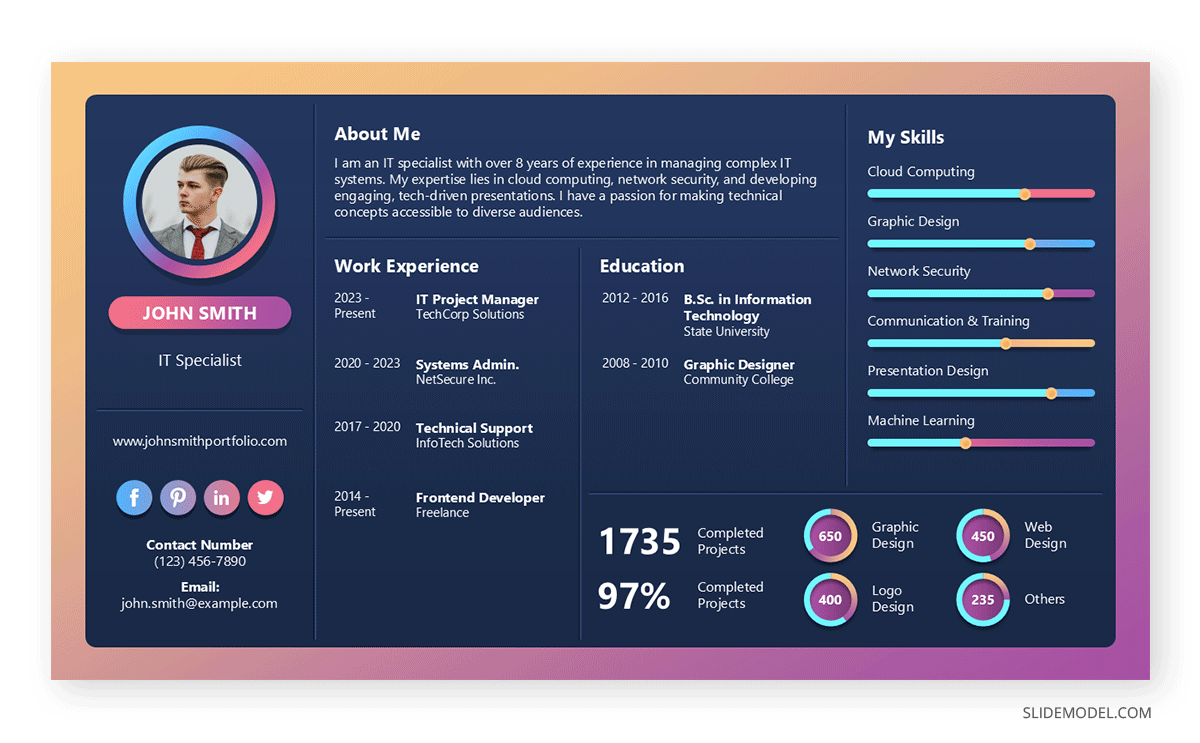
How to List Presentation Skills on a Resume
To list presentation skills description or presenting skills on your resume, you can include them in different sections. This might include the professional or career summary, area of expertise, skills, achievements, training, etc.
Professional Summary
Many people in their resumes have a professional or career summary highlighting key expertise, experience, and skills, usually in the form of a short descriptive paragraph or two. In such a summary, you can add references to presentation and public speaking skills. For example, you can mention your experience presenting project plans and proposals before potential investors or your public speaking skills to highlight your ability to interact with stakeholders.
Skills/Area of Expertise
Some people prefer adding a section highlighting skills or areas of expertise in a resume. This is a list of key expertise an individual might have, e.g., project management, budgeting, data analysis, etc. You can add public speaking, presentation design, and other related skills and expertise to this section.
Achievements
It is always a good idea to mention achievements on a resume. This can include achievements mentioned under each job experience or in a separate section. If you have any achievements tied to public speaking or presentations, they can be listed in such a section. Many times, this might not directly include making presentations or working on PowerPoint templates or Google Slides templates . If you have conducted training or capacity-building exercises, the chances are that you have had to use presentations. By highlighting the design of such modules and slide decks, you can highlight your skills as a presenter while alluding to an achievement, such as training a specific number of people during a project or assignment.
Certifications and Training
If you have received certifications or training that include improving public speaking or presentation skills, you can mention them to highlight presentation skills on your resume.
Mention Presentation Tools
In many resumes or online job application forms, there is a section to mention computer proficiency, tools, or skills that include the use of different software. In such a section, you can list tools like PowerPoint, Prezi, Google Slides, etc. If it is a section that can accommodate both software proficiency and general skills, you can also mention public speaking, presentation design, presenting pitch deck, and other such skills.
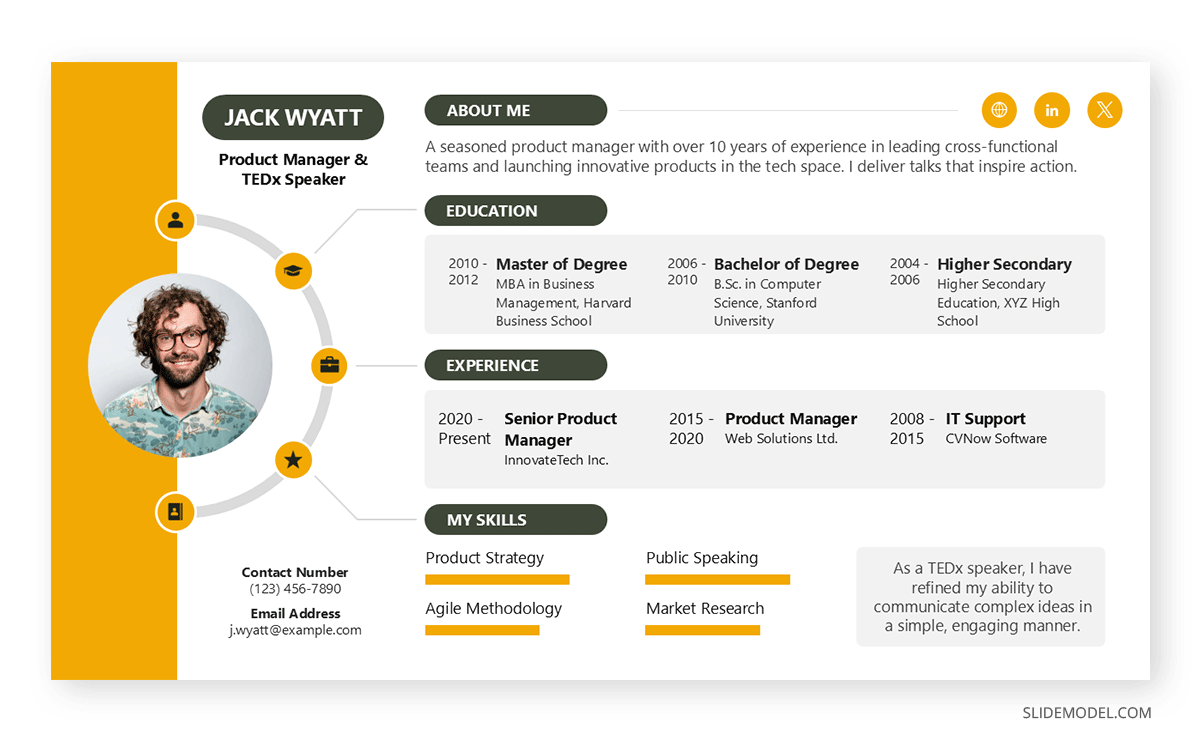
Frequently Asked Questions
Yes, listing presentation skills on the resume can be helpful to highlight your ability as a public speaker, as well as other skills, such as written and verbal communication.
Presentation skills showcase not only your ability as a public speaker but also proficiency in verbal and written communication, leadership potential, stakeholder management ability, and other desired skills employers often seek.
There are different sections in a resume where presentation skills can be listed by referring to tools, training, and activities you might have been engaged in. Some examples include professional summary, skills, achievements, training, and job experience sections.
Many resumes and online job application forms allow adding software proficiency or skills where software like PowerPoint, Prezi, Google Slides, and others can be mentioned.
Some examples of presentation skills that can be listed on a resume include the following: Public speaking Presentation design Storytelling Storyboarding Pitch decks Visual communication Audience engagement Coaching and mentoring Event moderation Training (e.g., mention a training you can deliver, such as research design training) You can also learn more about highlighting key presentation skills on a resume from this tutorial about presentation skills guide and our tips on making about me slides .
Yes, you can create data-driven presentations by quantifying achievements related to delivering presentations, training, or engaging stakeholders. Example: “ Developed and delivered training on visual aids to 40% of sales staff at Company X, resulting in an increase of 10% in quarterly sales due to improved pitch decks”.
Yes, you can always mention skills, even when you might have little experience. You can mention group projects, volunteer activities, visual aids you might have designed, or informal training you might have delivered to help people improve their presentation or when your persuasive skills helped achieve desired results.
You can improve your presentation skills by practicing your presentation skills before friends and colleagues or through local events, taking training courses, seeking mentorship, and recording yourself presenting to assess and improve your skills.
Final Words
Presentation skills can help make your resume stand out. Your public speaking and presentation skills, not only highlight your written and verbal communication skills but also your confidence, leadership potential, ability to visualize information, and other valued skills that can make your resume stand out.
While you might not need to directly include such skills in a resume, adding subtle hints might be sufficient, such as the ability to use different presentation software, mentioning the types of training you might have delivered, the impact of presentations you might have delivered, your skills in visual communication, etc. This can be a much better approach than spelling out that you are a good presenter unless your job requires such a specific skill. Hence, presenting skills can enable your resume to shine regardless of whether you are a communications or public speaking specialist.
If you lack presentation and public speaking skills, you can look into methods to improve them, such as by learning how to make a presentation if you’re a beginner. It might also help to get expert advice on how to start a presentation and how to end a presentation to hone your skills as a public speaker.
Like this article? Please share
Presentation Skills, Resume Filed under Business
Related Articles

Filed under Presentation Ideas • November 19th, 2024
What is the Best Way to Deliver Presentations with Authenticity
Do you feel as if your presentations look dull or robotic? Discover how to bring authenticity to your slides and speech with this guide.

Filed under Presentation Ideas • October 23rd, 2024
Formal vs Informal Presentation: Understanding the Differences
Learn the differences between formal and informal presentations and how to transition smoothly. PPT templates and tips here!
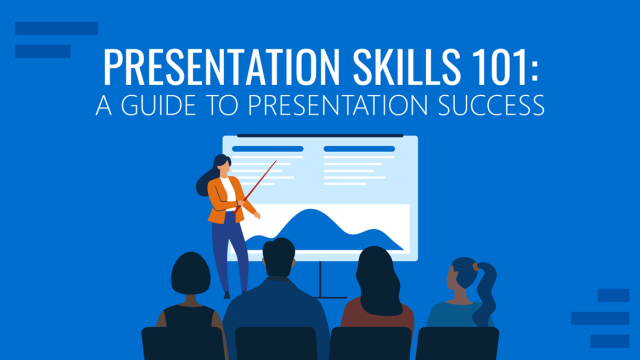
Filed under Education • October 21st, 2024
Presentation Skills 101: A Guide to Presentation Success
Building your presentation skills is a must-do in the career of any professional presenter. Cultivating some of these practices can guarantee an impact on the performance of your delivered message, so join us to discover how you can train for the required presentation skills.
Leave a Reply

IMAGES
COMMENTS
How to include presentations on your resume The following steps show you how to write your resume to include presentations, public speaking events and other conferences you participated in: Create a section for presentations. Place the most relevant presentation first. Include the presentation title in italics. List the name and date of the ...
How to Highlight Presentation Skills on Resume. Highlighting your Presentation Skills on a resume is essential for showcasing your ability to communicate effectively and engage an audience. Strong presentation skills are highly valued in many industries, making it crucial to emphasize them in your job application.
For example, you would write conferences on your resume like this. Smith J and O'Neill T (2021, August) Example Presentation. Presented at Example Conference, New York. Example of adding a session with a panel: Panel led by Smith J and O'Neill T (2021, August) Example Presentation. Presented at Example Conference, New York
2. Add the section title to your resume. If you're listing all the presentations, call it "Conference Presentations." If you chose the top five, call it "Selected Conference Presentations." 3. Type the name of the presentation first. This should match what was printed the program or listed online for the conference. 4.
Presentation Experience: Demonstrated ability to effectively communicate complex ideas through engaging presentations, leading to successful knowledge transfer and improved team collaboration. Conclusion. Now that you have a better understanding of how to include "give presentations" on your resume, both formally and informally, you can ...
Yes, including resume presentation skills in your skills section is highly beneficial, especially if the job role you're applying for involves communication or public speaking. This is particularly important if you're in fields such as sales, marketing, education, or leadership roles where presenting is a key part of the job. ...
25+ presentation skills [examples for your resume] Presentation skills run the gamut from soft skills like effective communication to hard skills like proficiency in presentation software. Let's run down some of the most common and important presentation skills we see on the strongest resumes across a range of industries.
Whether you're a solid writer or someone who composes presentations on the fly, based on something you scribbled on the back of an envelope 10 minutes ago, composition skills are critical. If your public speaking skills include the ability to compose presentations, be sure to convey that information on your resume.
Summaries of professional contributions to your field might provide a more thorough testimony to your expertise and experience. Consider the following steps for writing a resume with presentations: 1. Create a resume section for research or presentations Create a section of your resume for your presentations or research for an organized layout.
What are some examples of presentation skills to include on a resume? Some examples of presentation skills that can be listed on a resume include the following: Public speaking Presentation design Storytelling Storyboarding Pitch decks Visual communication Audience engagement Coaching and mentoring Event moderation Training (e.g., mention a ...